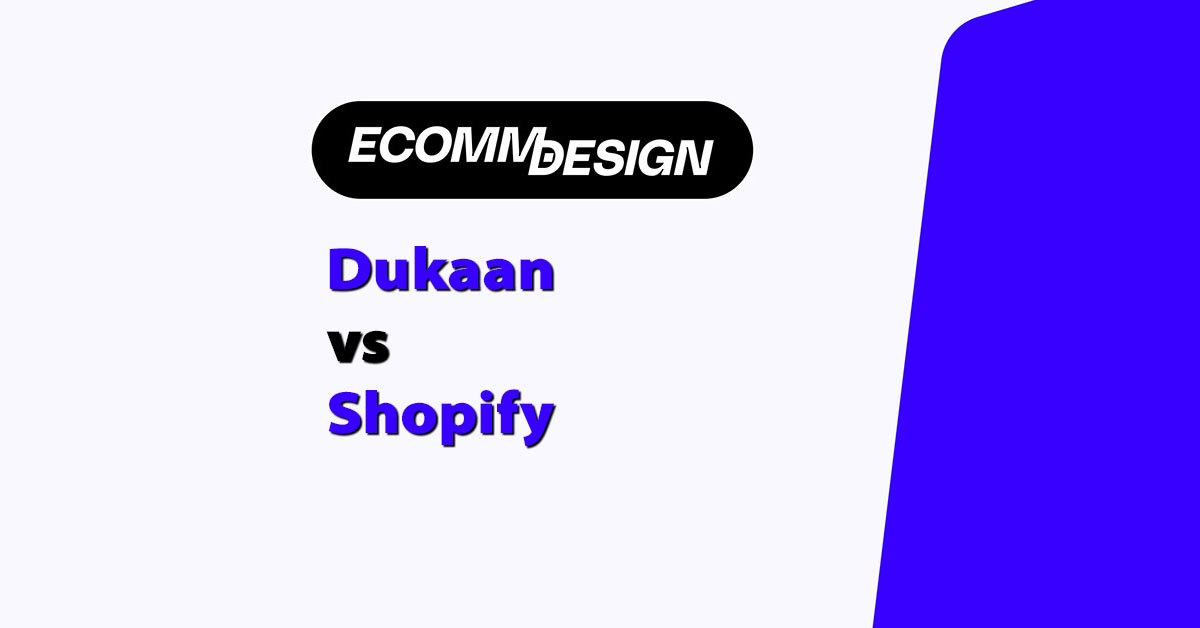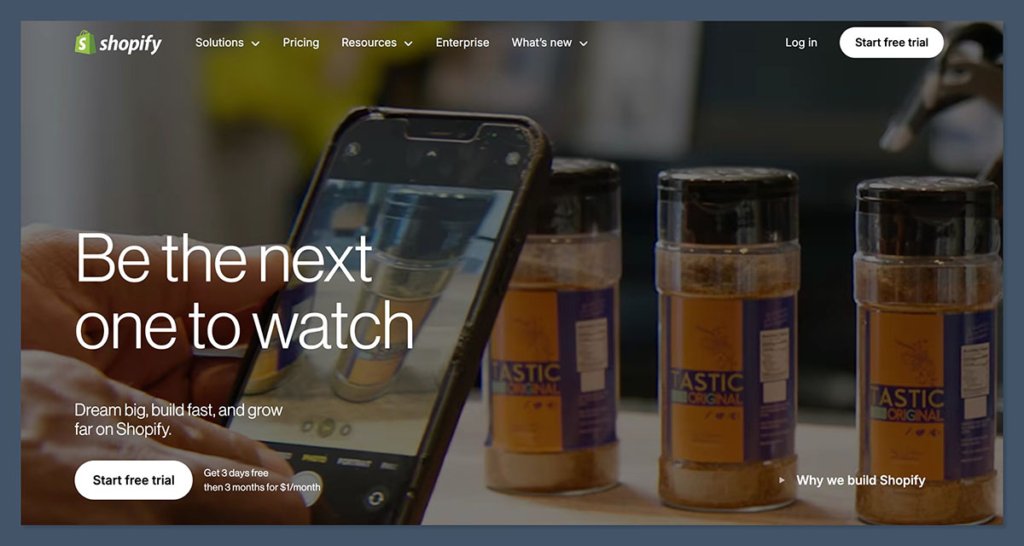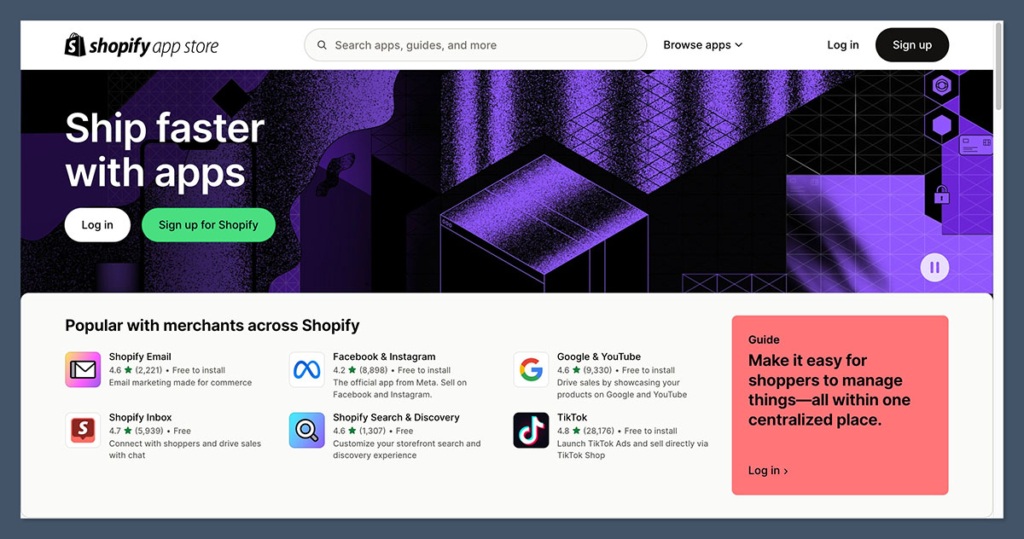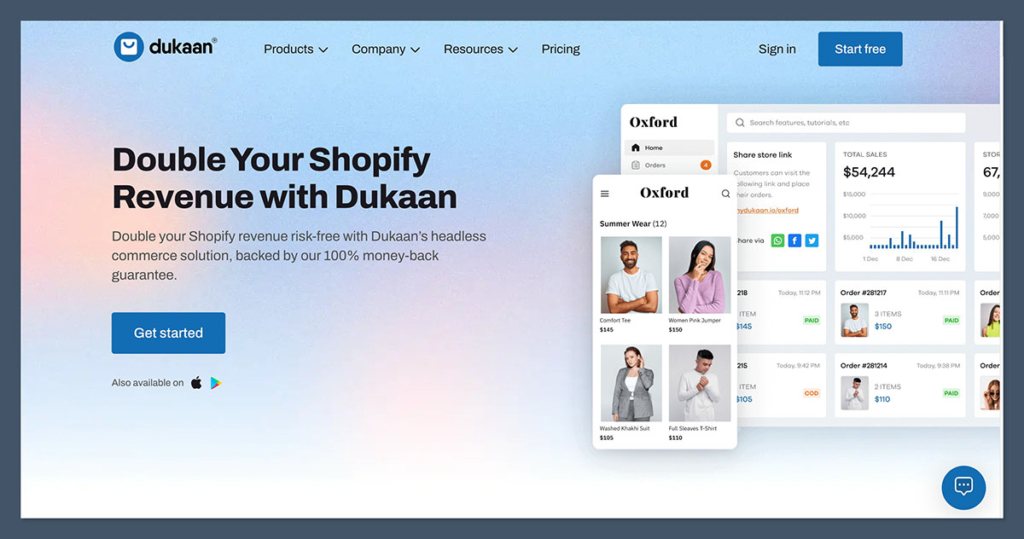
Quick answer: Shopify is the better option if you’re building a scalable, feature-rich ecommerce brand—especially one with international ambitions.
Dukaan, however, is a fantastic choice for Indian entrepreneurs looking to launch a store fast, without the bells and whistles.
I’ve personally tested both platforms, built stores on each, and compared them across key categories like pricing, ease of use, templates, payments, apps, and more.
If you’re stuck choosing between Shopify and Dukaan, here’s what I found.
Dukaan vs Shopify: Quick Verdict
- Shopify – Best for serious ecommerce sellers, advanced functionality, and global reach
- Dukaan – Best for Indian sellers who want a quick setup, mobile-first store, and no coding required
Quick Comparison: Dukaan vs Shopify
| Feature | Shopify | Dukaan |
|---|---|---|
| Overall Rating | 4.8 | 4.0 |
| Starting Price | $29/month | Free plan available |
| Trial | 3 days + $1/month for 3 months | 7-day free trial |
| Best For | Global ecommerce, growing brands | India-based solo sellers |
| Templates | 100+ premium themes | Few templates, mobile-first |
| Payment Options | 100+ gateways | Razorpay, Stripe, Cashfree |
| App Store | 8,000+ apps | Limited integrations |
| AI Tools | Shopify Magic, SEO booster | None |
| Multilingual Support | 30+ languages | India only |
| Ease of Use | Easy | Extremely beginner-friendly |
| Support | 24/7 Live Chat | Email + WhatsApp |
Best for Pricing: Dukaan Is Cheaper, But Shopify Has More to Offer
If pricing is your top concern, Dukaan is the clear winner here—especially for new or local sellers in India.
- Dukaan starts with a free plan, giving you immediate access to basic store-building tools.
- Its paid plans are very budget-friendly, starting as low as $1.35/month.
- Even its highest-tier plan comes in at under $130 per year, which is still cheaper than a single month of Shopify’s Advanced plan.
On the other hand, Shopify’s pricing starts at $29/month for the Basic plan. There’s a 3-day free trial, followed by an introductory deal of $1/month for 3 months, which gives you some time to explore the platform without committing full price right away.
After the trial period, you’re looking at:
| Shopify Plan | Price (USD/month) | Billed Annually? |
|---|---|---|
| Basic | $29 | Yes |
| Shopify | $79 | Yes |
| Advanced | $299 | Yes |
Compared to Dukaan, these price points may feel high—but you’re getting much more in terms of infrastructure and scalability.
Here’s a breakdown of what that higher cost includes on Shopify:
- Built-in AI tools like Shopify Magic for product descriptions
- Multi-currency and multilingual support
- Advanced ecommerce analytics and reporting
- 8,000+ third-party app integrations
- Support for international tax, shipping, and checkout features
Dukaan, on the other hand, is more minimal by design. It doesn’t offer the same depth of tools, but for many sellers—especially those starting out in India—that simplicity is a benefit, not a drawback.
My recommendation:
If you’re selling locally in India and don’t need advanced ecommerce tools, Dukaan is incredibly affordable.
It’s ideal for solopreneurs, side hustlers, and small businesses on tight budgets. But if you plan to grow, scale, or expand internationally, Shopify’s higher price is worth it for the advanced capabilities it unlocks.
Best for Selling Online: Shopify Offers More Sales Power

Both platforms let you sell physical and digital products. But when it comes to features that help you drive revenue, increase conversion, and streamline operations, Shopify pulls ahead quickly.
Shopify advantages:
- Shopify Magic uses AI to auto-generate product descriptions based on keywords, tone, and formatting preferences.
- Advanced inventory tools allow you to track SKUs, manage variants, and automate stock alerts.
- Custom product fields let you personalise the shopping experience, especially useful for configurable products.
- Abandoned cart recovery is built into the Basic plan, allowing you to automatically email customers who didn’t complete their checkout.
- Discount engine supports bundle pricing, BOGO deals, and advanced promotion rules.
These features are built to support serious ecommerce growth. From my experience, Shopify is excellent at handling product-heavy catalogs, multiple sales channels, and promotions that increase average order value.
Dukaan strengths:
- WhatsApp-based ordering makes it easy for sellers to receive direct orders and respond in real-time—great for relationship-driven local selling.
- Shipping integrations with Indian logistics providers like Shiprocket, Dunzo, and Delhivery simplify fulfillment for domestic sellers.
- Minimal setup—you can list products, set prices, and launch in under an hour.
- Catalog-style selling works well for businesses with small or medium-sized product lists and limited variations.
While Dukaan is much lighter on features, it’s optimised for quick selling without needing a deep ecommerce strategy. That makes it especially useful for food businesses, boutique clothing sellers, and hyperlocal services.
Here’s a quick comparison of their core selling features:
| Feature | Shopify | Dukaan |
|---|---|---|
| AI Tools | Yes (Shopify Magic) | No |
| Abandoned Cart Recovery | Yes (Built-in) | Yes (Basic via email) |
| Inventory Management | Advanced with variants/SKUs | Basic |
| Sales Channel Support | Amazon, Instagram, TikTok, etc. | WhatsApp, Local delivery |
| Shipping Integrations | Global + custom | India-based partners |
| Product Bundling & Upsells | Yes | No |
If you’re managing a large catalog, dropshipping, or selling across channels like Amazon, TikTok, or Instagram, Shopify handles that without breaking a sweat.
The platform’s backend is robust enough to support high-volume operations, making it a go-to for fast-scaling businesses.
My verdict:
Shopify wins for serious sellers who need powerful tools, integrations, and scalability.
Dukaan is best suited for solo entrepreneurs or local sellers who want to get a store live quickly, without technical friction.
If simplicity and speed are your priorities, Dukaan is a great pick. If growth and automation matter more, go with Shopify.
Payment Options: Dukaan Avoids Transaction Fees, Shopify Is More Versatile
Getting paid is a key part of running any online business, and the way your platform handles payments can have a real impact on both your bottom line and the customer experience. Both Dukaan and Shopify give you reliable payment options, but they approach it differently.
When it comes to payments, here’s the tradeoff:
| Platform | Payment Gateways | Transaction Fees |
|---|---|---|
| Shopify | 100+ options including Shopify Payments, PayPal, Stripe, Apple Pay | 2.9% + $0.30 per transaction (Basic plan) |
| Dukaan | Razorpay, Cashfree, Stripe, UPI | 0% from Dukaan (only gateway fees apply) |
Shopify payment highlights:
- Over 100 payment gateway integrations support global customers, making it ideal for international selling.
- Shopify Payments (their native gateway) reduces transaction fees and streamlines the process—but it’s only available in select countries.
- If you don’t use Shopify Payments, you’ll pay extra transaction fees, which can add up depending on your volume.
- The more advanced your Shopify plan, the lower your payment processing rate becomes.
Dukaan payment highlights:
- No platform-level transaction fees, which means Dukaan doesn’t take a cut of your sales—just the processing fees from your gateway (Razorpay, Stripe, or UPI).
- For Indian sellers, Razorpay and UPI are seamless, with great support for local banking and COD (Cash on Delivery) options.
- Setup is fast and built into the onboarding process—most merchants can start accepting payments within minutes.
The biggest difference comes down to scope. Shopify is made for businesses that may need to:
- Accept payments in multiple currencies
- Sell internationally and comply with local tax rules
- Offer express checkout via Apple Pay, Google Pay, or Meta Pay
Dukaan, on the other hand, keeps it simple and local. It’s ideal if:
- You only need Indian payment options
- You’re using UPI or WhatsApp to complete orders
- You want to avoid complex setup and recurring fees
My take:
Dukaan has the edge for Indian merchants thanks to low friction, local integrations, and zero platform fees. It’s straightforward, with no surprises.
But if you’re planning to scale globally or want to offer a broader set of payment experiences—including subscriptions, tipping, or multi-currency—Shopify is more versatile and better suited to complex operations.
App Market: Shopify Has a Huge Ecosystem

This is where Shopify completely outclasses Dukaan—not just in size, but in flexibility and potential for scale.
- Shopify has over 8,000 apps in its marketplace, covering everything from marketing automation and email tools to inventory management, accounting, subscriptions, reviews, and more.
- Dukaan’s app selection is minimal, focusing mainly on essential tools like invoicing, WhatsApp chat, lead capture forms, and basic CRM. For sellers who want an ultra-simple setup, this might be fine. But there’s not much room to grow beyond that.
Shopify app ecosystem highlights:
- Klaviyo: Powerful email and SMS marketing automation platform
- Yotpo: Enables product reviews, UGC, and loyalty programs
- Printful: For print-on-demand and dropshipping
- Recharge: For recurring billing and subscription-based products
- Zendesk, QuickBooks, Judge.me, Gorgias, and Loox: Cover everything from customer service to analytics and social proof
Whether you’re looking to:
- Integrate with marketplaces like Etsy or Walmart
- Add cross-sell popups and upsell funnels
- Build custom shipping rules
- Sync your data with accounting platforms
- Run affiliate programs or loyalty rewards
…Shopify has an app for that—and probably ten different ones to choose from.
Dukaan app highlights:
- WhatsApp live chat
- Google Sheets-based invoicing
- Simple lead forms
- Abandoned cart reminders (basic)
There’s no app marketplace in the traditional sense. Most of Dukaan’s tools are built-in or integrated through direct toggles in the settings, but they’re extremely limited in scope.
Here’s a breakdown:
| Feature/Use Case | Shopify (8,000+ apps) | Dukaan (limited tools) |
|---|---|---|
| Email Marketing | Klaviyo, Omnisend, Mailchimp | Basic WhatsApp/email capture |
| Reviews & Social Proof | Yotpo, Judge.me, Loox | No dedicated review tools |
| Subscriptions | Recharge, Appstle | Not supported |
| CRM & Analytics | HubSpot, Zoho, GA4 sync | Manual CSVs, basic dashboards |
| Shipping Automation | ShipStation, Easyship | Integrated with Shiprocket |
| AI & SEO Enhancers | Plugin SEO, Tapita AI | Not available |
Verdict:
Shopify wins this easily. If you want to expand functionality, automate workflows, or customise your backend, Shopify’s app market gives you serious power.
It’s one of the key reasons why I recommend Shopify to clients who are planning to scale or want a highly tailored ecommerce setup.
Dukaan might work for simpler use cases, but it doesn’t support the kind of growth-focused workflows modern businesses rely on.
Marketing Features: Shopify Wins by a Mile
Marketing your store is where Shopify shines, and it’s one of the biggest reasons why many serious ecommerce brands stick with the platform long-term.
Whether you’re trying to build awareness, retarget visitors, or convert first-time buyers into repeat customers, Shopify gives you tools that are either built-in or easily added via apps.
Shopify includes:
- Shopify Email to create, send, and manage branded email campaigns right from your dashboard. No third-party platform needed.
- Shopify Audiences (available on higher plans) lets you retarget high-intent customers on platforms like Facebook and Instagram with better data segmentation.
- SEO tools include automatic sitemap generation, structured metadata, and customizable URL slugs.
- Integration with Semrush via the Ecommerce Booster app helps you build a step-by-step optimisation plan to improve organic traffic.
- Multichannel selling through Amazon, Etsy, TikTok, Facebook, and Instagram makes it easy to sync your product catalog and boost visibility across platforms.
You can also automate marketing workflows through apps like Klaviyo or Omnisend, run popups using Privy, and drive urgency with countdown timers or scarcity widgets—all directly from the Shopify ecosystem.
Dukaan offers:
- Basic SEO tools including meta titles, descriptions, and custom URLs.
- WhatsApp broadcast tools for customer updates and promotions.
- Simple coupon generator for percentage or flat discounts.
- Abandoned cart emails, which can be enabled quickly but don’t offer much customisation or segmentation.
Dukaan’s marketing tools are geared toward local selling. If you rely heavily on WhatsApp and repeat local customers, they’re actually quite effective.
But they lack the depth and automation that larger campaigns or multi-touch journeys require.
Here’s a side-by-side breakdown:
| Feature | Shopify | Dukaan |
|---|---|---|
| Email Marketing | Shopify Email, plus Klaviyo, Omnisend | WhatsApp broadcast only |
| Abandoned Cart Recovery | Yes, with custom sequences | Basic one-step email |
| Retargeting Ads | Shopify Audiences (Meta + Google integration) | Not available |
| SEO Management | Advanced with Semrush, sitemaps, redirects | Basic fields (title, slug, description) |
| Social/Marketplace Integration | Amazon, TikTok, Instagram, Etsy | WhatsApp sharing only |
| Automation & Popups | Privy, Justuno, Tidio | Not supported |
Final word:
Shopify wins. Whether you’re building a marketing funnel, running paid ads, or nurturing customers with email flows, Shopify gives you everything you need—either natively or through high-quality third-party tools.
Dukaan keeps things simple, and that works well for hyperlocal communication. But it just doesn’t compete when it comes to full-scale ecommerce marketing.
SEO and Internationalisation: Shopify Is Made for Global Selling
If you’re thinking long-term or planning to target customers outside of India, Shopify is the smarter option by far.
It’s not just about visibility on search engines—Shopify also helps you localise your site for different regions, currencies, and languages. That combination is crucial if you want to grow beyond a local market.
Here’s how the two platforms compare:
| Feature | Shopify | Dukaan |
|---|---|---|
| Multilingual Support | Yes (30+ languages supported) | No |
| Currency Switcher | Yes (multi-currency checkout) | INR only |
| SEO Apps | Yes (Semrush Booster, Smart SEO) | No dedicated SEO apps |
| URL Structure Control | Full control with redirects & slugs | Basic slug editing only |
| International Domains | Supported via Shopify Markets | Not available |
Shopify helps you:
- Localise your storefront using translated versions of your site, based on the visitor’s browser language.
- Automatically redirect visitors to the right regional version of your store based on location.
- Display prices in local currencies, with tax-inclusive pricing and geolocation tools.
- Build SEO-friendly URLs, optimise meta data, create 301 redirects, and use structured data for rich snippets.
- Access third-party SEO tools like Semrush, Yoast, and JSON-LD through Shopify’s app store.
All of this means that Shopify is built for serious ecommerce growth across markets. If you’re targeting users in the US, Europe, Middle East, or Southeast Asia, it offers the flexibility and infrastructure you’ll need from day one.
Dukaan supports:
- Basic SEO tools, such as setting meta titles and slugs for individual product and category pages.
- No language switching, which means the entire storefront is fixed to English or Hindi (depending on what you write).
- INR as the only currency, which limits your reach to Indian buyers.
- No app support for schema markup, hreflang tags, or SEO reporting dashboards.
For Indian businesses serving a local audience with a fixed product line and no plans for cross-border expansion, Dukaan’s SEO tools will likely be enough.
But if you want to rank on Google globally or offer different language versions of your site, you’ll run into limitations very quickly.
Verdict:
Shopify is the better platform for SEO and cross-border ecommerce.
The flexibility it gives you—combined with advanced apps and localisation tools—makes it the clear choice for businesses looking to grow in international markets.
Dukaan works fine for Indian sellers focused on a single language and currency, but it’s not built for multi-region growth.
Templates and Store Design: Shopify Offers More Variety and Control
When it comes to how your store looks and feels, Shopify gives you a broad canvas to work with.
Whether you’re building a minimalist fashion brand, a bold tech store, or a handcrafted skincare line, Shopify’s template library has something for every niche.
Shopify’s design strengths:
- 100+ professionally designed templates, with 13 free themes and dozens of paid ones ranging from $100 to $400 (one-time cost).
- Templates are industry-specific, including categories like fashion, electronics, food, home goods, and more.
- Each theme supports customisable sections, advanced typography control, and media-rich layouts like video banners and product galleries.
- Access to the Liquid code (Shopify’s theme language) allows developers to fully customise the frontend if needed.
You can also preview themes before purchasing, switch between them, and modify layouts using Shopify’s section-based editor.
Dukaan’s design strengths:
- Simple and mobile-first templates, designed to look good on phones by default.
- Easy to customise basic elements like logo, brand colours, and banner images.
- Great for catalog-style stores—clean, visual, and fast loading.
But here’s the catch: Dukaan’s templates are extremely limited in both variety and flexibility.
There’s no theme marketplace, no developer access, and no way to deeply personalise the storefront beyond basic content and branding.
Here’s a side-by-side summary:
| Feature | Shopify | Dukaan |
|---|---|---|
| Total Templates Available | 100+ (13 free) | Limited, undisclosed number |
| Paid Theme Range | $100 – $400 (one-time) | Not applicable |
| Industry-Specific Designs | Yes | No |
| Advanced Layout Control | Yes (sections, code access) | No |
| Mobile Optimisation | Yes | Yes (mobile-first focus) |
My view:
Shopify gives you far more flexibility to make your store look unique and tailored to your brand. It’s ideal for businesses that need visual polish and brand control.
Dukaan, meanwhile, is great if you just want a quick plug-and-play layout that works out of the box with minimal tweaking.
Ease of Use: Dukaan Is More Beginner Friendly

Let me be clear—Shopify is not hard to use. But there’s a learning curve, especially if it’s your first time setting up an online store.
Dukaan, on the other hand, is designed to be fast, simple, and intuitive—even for someone who has never built a website before.
Dukaan highlights:
- Sign up and launch a store in under 10 minutes—the onboarding process is minimal.
- No coding needed—store elements are configured through toggles and text fields.
- Mobile-first dashboard makes it easy to manage your store on the go.
- Streamlined backend with just the essentials—product list, orders, settings, and customer messages.
Shopify onboarding:
- Step-by-step setup checklist helps guide you through setup, including payments, products, domain, and design.
- Section-based editor is simple, but more detailed than Dukaan—it lets you drag elements within each section.
- Requires more decisions and setup early on—apps, shipping rates, payment gateways, taxes, etc.
Dukaan is especially effective for businesses that rely on WhatsApp-based selling, because its workflows are optimised around messaging, direct orders, and local fulfilment.
Here’s how ease of use compares:
| Feature | Shopify | Dukaan |
|---|---|---|
| Store Launch Time | ~1 hour with setup | 10–15 minutes |
| Technical Skill Required | Beginner to intermediate | Complete beginner |
| Editor Type | Section-based (semi-visual) | Form-style content inputs |
| Best Use Case | Customisable, long-term stores | Quick-start, mobile-first sales |
| Mobile App Available | Yes | Yes |
Verdict:
Dukaan is the winner for ease of use. It’s built for speed and simplicity.
Shopify requires more setup and understanding of ecommerce operations, but it gives you greater control once you’re up and running.
Support and Help Resources: Shopify Offers 24/7 Coverage
Customer support matters a lot when you’re launching or scaling an online business.
If something goes wrong—or if you’re just stuck setting up shipping—being able to get help quickly can make or break your experience.
Here’s how the two platforms stack up:
| Feature | Shopify | Dukaan |
|---|---|---|
| Live Chat | 24/7 via Help Center | Business hours via WhatsApp |
| Phone Support | Yes (Shopify Plus only) | Not available |
| Email Support | No longer available | Yes |
| Help Center | Extensive guides and tutorials | Limited FAQs and walkthroughs |
| Community Forum | Yes | No |
| Social Media Support | Facebook, Twitter, Instagram | No |
Shopify support features:
- 24/7 live chat, available even on the Basic plan.
- A deep Help Center filled with guides, video tutorials, and ecommerce advice.
- A thriving community forum, where both merchants and Shopify staff answer questions daily.
- Shopify Partners and Experts are available if you want one-on-one help with development, marketing, or store setup.
Dukaan support features:
- Support is available via email and WhatsApp, but it’s not round-the-clock.
- Help content is limited to a few FAQs and walkthroughs.
- There’s no forum, partner directory, or marketplace for hiring expert help.
This difference becomes more noticeable as your store grows.
For basic operations, Dukaan’s team is responsive. But when you need advanced help—or want to scale—Shopify’s support network is far more comprehensive.
Winner:
Shopify takes the lead here. Its 24/7 chat, educational content, and community-driven support make it a safer long-term option.
Dukaan does well for fast answers during local business hours, but the lack of around-the-clock help or depth in documentation can be a blocker when issues get technical.
Final Verdict: Shopify for Growth, Dukaan for Simplicity
Both platforms serve very different types of businesses, and the right choice depends entirely on your goals, budget, and technical experience.
Choose Shopify if:
- You’re building a serious ecommerce brand with plans to scale over time.
- You want access to advanced tools like multichannel selling, automation, third-party app integrations, and customisation.
- You’re planning to sell internationally, manage multiple currencies, and localise your store by language and region.
- You value having 24/7 support, detailed analytics, and long-term scalability.
- You’re willing to invest more upfront for a platform that grows with your business.
Choose Dukaan if:
- You’re selling within India and want to get up and running fast—especially via WhatsApp or local delivery apps.
- You don’t want to deal with code, plugins, or complex setup.
- You’re starting a side hustle, local service, or micro-business with a lean team (or just yourself).
- You value simplicity and affordability over advanced functionality.
Here’s a final side-by-side comparison to help you choose:
| Use Case | Best Platform |
|---|---|
| International ecommerce | Shopify |
| Indian local business | Dukaan |
| Complex product catalog | Shopify |
| WhatsApp-based selling | Dukaan |
| Visual design flexibility | Shopify |
| Budget-friendly entry | Dukaan |
| Subscription or print-on-demand model | Shopify |
| No-code, fast launch | Dukaan |
From my experience building stores on both platforms, here’s how I look at it:
- Shopify is my go-to when working with brands that are in it for the long haul—whether they’re selling globally, using advanced marketing funnels, or planning complex inventory management.
- Dukaan is what I recommend to local sellers, food vendors, or first-time store owners who just need something live by the end of the day—with zero hassle.
They both have their place. But they’re built for different paths. One gives you simplicity, the other gives you scale.






